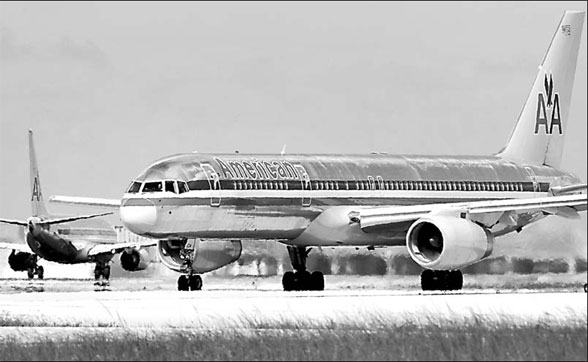Rising fuel costs to hit carriers hard
|
An American Airlines 757 jet waits for an American Airlines 737 jet to take off at Miami International Airport. Bloomberg News |
Rising fuel costs will be the main culprit cutting into US airlines' profits this year, with credit market turmoil and slowing passenger demand also expected to hamper the industry worldwide.
High jet-fuel prices will limit US airlines' combined profitability to between $3.5 billion and $4.5 billion in 2008, compared with last year's estimated profit of $5 billion, the Air Transport Association said.
Meantime, the International Air Transport Association, which anticipates profits for domestic and foreign carriers to fall to $5 billion from $5.6 billion, called signs of weakening passenger demand a "warning bell" for 2008.
To bolster their finances in the face of a slowing American economy, more expensive fuel and higher borrowing costs, US-based carriers must continue to improve fuel and other efficiencies while increasing their share of business and international travel, said ATA Chief Economist John Heimlich.
Higher fares also seem likely.
A spokeswoman for United Airlines said the second-largest US carrier raised domestic fares by $10 to $20 round-trip to offset rising fuel costs.
The move is the latest in a series airlines have attempted in recent months as the price of jet fuel has soared.
Shares of major carriers were pummeled in 2007 with big drops coming at the end of the year, as oil prices climbed toward $100 a barrel - a threshold broken last week.
"Rising oil prices have a disproportionately negative impact on US carriers, since oil is traded in dollars," Heimlich wrote in an e-mail.
"Foreign carriers generally have more robust hedge positions than US carriers, leaving them less exposed to the soaring oil prices."
Shares of American Airlines' parent AMR Corp finished down nearly 60 percent at $13.35 on December 31, while United parent UAL Corp dropped about 32 percent to close at $31.75.
On Friday, AMR closed down 14 cents to $13.21. UAL rose $1.40, or 4.4 percent, to $33.15, despite hitting a new annual low of $29.46 in earlier trading.
Value slides
British Airways shed about 43 percent on the London Stock Exchange last year, while Air France KLM lost 23 percent on the New York Stock Exchange.
Goldman Sachs last month cut its earnings estimates for most European carriers on expectations of lower prices this year.
Despite the expected decline in US carriers' profitability, a 2008 profit would mark the industry's third straight, which has not happened since 1998-2000 and would follow a five-year combined loss of $35 billion, Heimlich said.
His profit forecast includes domestic passenger and cargo airlines, while excluding bankruptcy and other charges.
Fuel costs are now the single biggest cost for airlines, followed by labor.
Jet fuel accounted for more than a quarter of US airlines' operating expenses in the second quarter of 2007, and are expected to represent about 28 percent of global expenses in 2007, according to industry officials.
Jet fuel prices hit about $2.65 a gallon in November, compared with $1.80 a gallon a year earlier, according to the US Energy Department.
The international airlines' trade group said on Friday that passenger traffic, as measured by revenue-per-kilometer flown, increased 9.3 percent in November, compared with the same month in 2006.
Through the first 11 months of 2007, passenger traffic rose 7.5 percent compared with last year.
International air-freight demand also grew in November, but the 3.5 percent jump was down from October's 3.6 percent growth.
Through November, freight demand is up 3.9 percent compared with the year-ago period.
But the outlook is less rosy.
"We ring in 2008 with a warning bell," IATA Chief Executive Giovanni Bisignani said in a release, pointing to concerns ranging from high oil prices to the global credit crunch.
"Passenger demand growth is expected to fall to 5 percent. And the expected increase in freight demand growth to 4.3 percent will only help us recover some of the ground lost against sea shipping."
Agencies
(China Daily 01/08/2008 page16)















